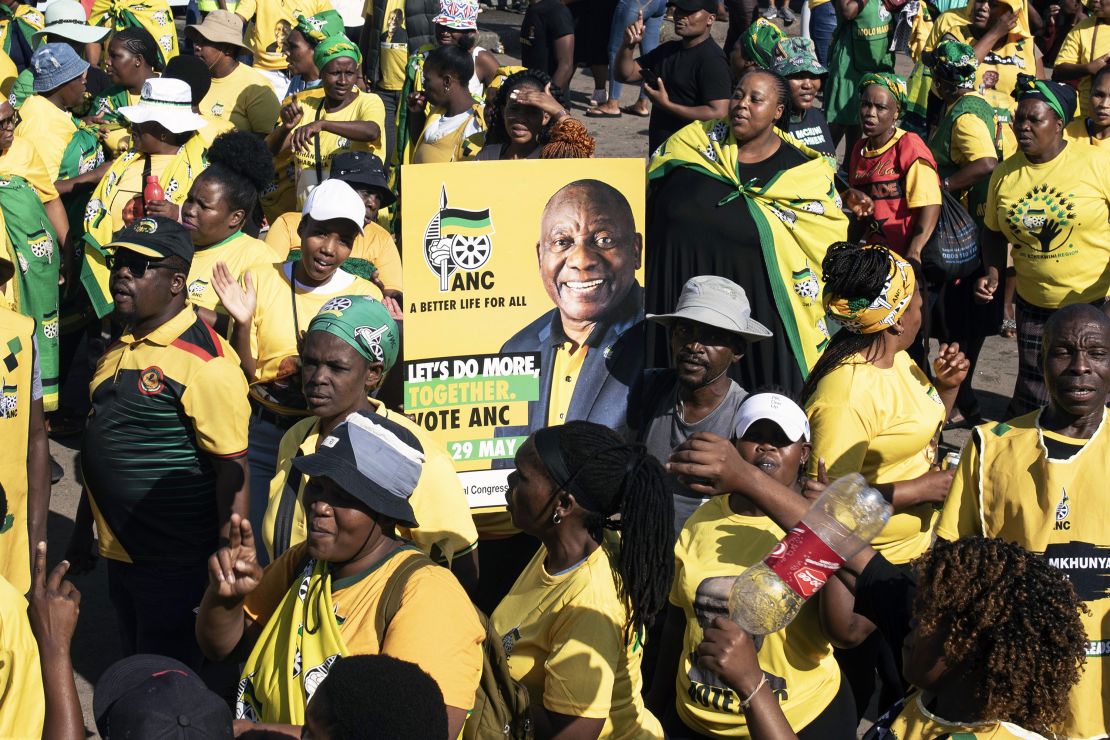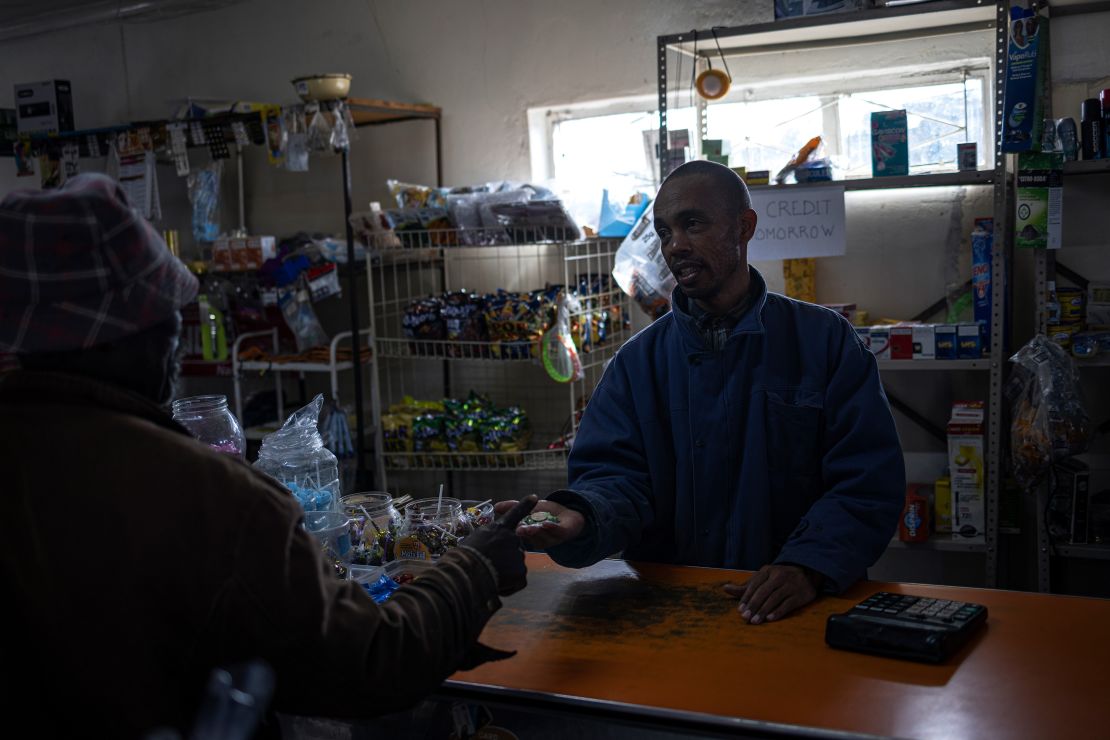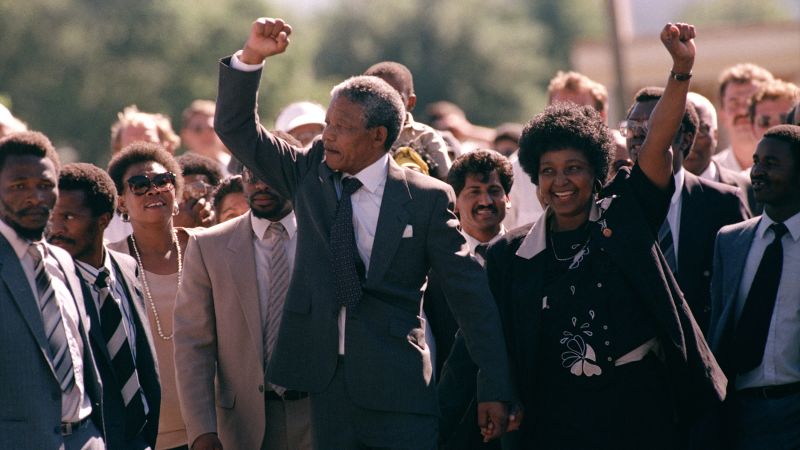South Africa’s ruling African National Congress (ANC) swept to power in 1994 on a pledge to “build a better life for all,” winning almost 63% of the vote in the country’s first democratic election.
Fast-forward 30 years and Nelson Mandela’s erstwhile liberation movement, which triumphed over the racist apartheid government, risks losing its parliamentary majority for the first time, according to opinion polls and analysts.
When South Africans vote Wednesday, an unhappy combination of rampant corruption, soaring joblessness, crippling power cuts and feeble economic growth will likely be top of mind.
The economy has gone backward over the past decade, evidenced by a sharp fall in living standards. According to the World Bank, gross domestic product per capita has fallen from a peak in 2011, leaving the average South African 23% poorer.
A third of the labor force is unemployed, more than in war-torn Sudan, and the highest rate of any country tracked by the World Bank. Income inequality is also the world’s worst. There are 18.4 million people on welfare benefits, compared with just 7 million taxpayers, according to Oxford Economics, a consultancy.
Black South Africans, who make up 81% of the population, are at the sharp end of this dire situation. Unemployment and poverty remain concentrated in the Black majority, in large part due to the failure of public schooling, while most White South Africans have jobs and command considerably higher wages.
Moreover, the government’s flagship policy for driving economic inclusion and racial equality in post-apartheid South Africa — Broad-Based Black Economic Empowerment, known as triple-BEE or simply BEE — has failed to achieve its aims, with wealth still concentrated in the hands of a few at the expense of the many.
“Three decades after the end of apartheid, the economy is defined by stagnation and exclusion, and current strategies are not achieving inclusion and empowerment in practice,” Harvard University concluded in a report published in November by its Growth Lab following two years of research.
Under apartheid — and colonial rule before that — Black South Africans were violently oppressed and denied many basic human rights. They were also systematically excluded from owning land, living in certain areas, and accessing a decent education and jobs.
The end of White minority rule could not on its own compensate for such extreme and prolonged injustice. Restitution was needed — and that’s what BEE set out to deliver.
There is now almost universal agreement that the policy failed to transform economic reality for the majority of Black and other South Africans who were historically disadvantaged, including Indians and Coloureds, the official term for South Africans with mixed heritage who have a distinct cultural identity.
President Cyril Ramaphosa, who has previously described BEE as “a must for (economic) growth,” promised Saturday the ANC would “do better” if reelected, with a focus on creating more jobs. The Democratic Alliance, the official opposition party, has said it would replace BEE with an “Economic Justice policy” that “targets the poor black majority for redress, rather than a small, connected elite.”
Critics of BEE argue there has been an overemphasis on increasing Black ownership of established businesses through giant deals that have, in fact, enriched only a handful of politically connected people.
This is a view held by Moeletsi Mbeki, brother of former President Thabo Mbeki and chairman of the South African Institute of International Affairs, an independent think tank located at Wits University in Johannesburg.
BEE “creates a class of rich politicians who are then beholden to the people who are making them rich, but it disincentivizes people from becoming entrepreneurs,” he told CNN. “If I became president, the first thing I would do would be to scrap BEE,” he added.
By Moeletsi’s telling, White executives devised BEE as a way to “coopt ANC leaders” in the early years of democracy by giving them shares in companies that they would then be disinclined to nationalize, a policy many in the party favored.
Still, despite tens of billions of dollars’ worth of BEE deals, Black ownership of companies stands at just 34% on average, according to the latest report by the B-BBEE Commission, which monitors adherence to the policy.
“Inroads are being made on the participation of Black people in the economy, although there is much further to go to realise the objectives (of BEE),” Commission head Tshediso Matona told CNN.

Black people are also poorly represented in top management, another of the policy’s focus areas. According to a recent PwC report, just 19% of the 200 most valuable companies listed in Johannesburg are led by Black, Coloured, Indian or Asian CEOs.
Many companies in the private sector “are not implementing the spirit of the (BEE) legislation… they’re (only) ticking boxes,” said Kganki Matabane, the CEO of the Black Business Council, a lobby group for Black business. “Businesses cannot continue to exclude the majority, they’ll render the country ungovernable one day,” he added.
Matthew Parks, the parliamentary coordinator for the Congress of South African Trade Unions, an umbrella body for labor unions and an ANC partner, says BEE has helped grow South Africa’s Black middle class but that more must be done for workers, particularly those on minimum wages.
He also argues that the policy needs more time to bear fruit. “Three decades given to overcome the impact of three centuries (of White oppression) is not enough.”
According to Matona, of the Commission, BEE is “only one part of a suite of policy tools to achieve transformation,” which also includes laws around public procurement, competition, employment equity and skills development. “The overall outcome of economic transformation requires an assessment of all of these policies,” he said.
The sharpest criticism of BEE is that it has been corrupted by private interests, leading to severe maladministration in the public sector. “It’s a huge driver of corruption in the country,” said Mbeki.
He and other experts who spoke to CNN explained that under the auspices of advancing empowerment, politically connected Black people have in some instances been put into senior positions in state-owned companies despite not having the right qualifications or experience.
Similarly, some officials have abused public procurement rules that favor Black-owned businesses, awarding government contracts at inflated prices to underperforming companies in exchange for bribes, a phenomenon sometimes referred to locally as “tenderpreneurship.”
“Tenderpreneurship” has devastated state-owned companies and local governments across the country, said Ricardo Hausmann, the director of Harvard’s Growth Lab, a hub for research on economic growth and development. “Poor implementation of affirmative action in the public sector” has contributed to “collapsing state capacity,” he told CNN. “The poster child of this is the electricity sector.”
For much of last year, South Africans were without power for at least some portion of the day. “Loadshedding” — as it’s known locally — hit a new record, with power cuts on 335 days, according to state-owned power utility Eskom. The years-long electricity crisis has abated in recent months, but it is not yet over.
Widespread graft at Eskom and other government institutions, primarily under former President Jacob Zuma, has been a core reason for the collapse of South Africa’s electricity, transport and, latterly, water infrastructure, according to Haroon Bhorat, an economics professor at the University of Cape Town.

The result has been to cripple economic activity. Economists estimate that GDP growth could be as high as 3%-5.4% this year were it not for crumbling infrastructure. Instead, the International Monetary Fund forecasts a paltry 0.9% expansion.
The “ultimate effect” of collapsing infrastructure leading to lower economic growth rates is “a governing party that is going to struggle to get urban voters to believe it can turn the economy around,” Bhorat added.
South Africa’s economy hasn’t always been in dire straits. For the first 15 years of democracy, the ANC “managed the economy relatively well,” Bhorat said.
Under Thabo Mbeki, public debt fell considerably and the government even recorded small budget surpluses between 2006 and 2008, meaning it spent less than it received in taxes. Economic growth averaged around 4% a year.
In contrast, under Zuma, South Africa’s credit rating was downgraded to junk, or sub-investment grade, by S&P and Fitch. GDP growth averaged around 1.5% a year and the debt-to-GDP ratio more than doubled from a post-apartheid low of 24% in 2008, according to the IMF. It is now hovering around 75%.
While South Africa was far from perfect under Mbeki — violent crime was high, the country remained extremely unequal and public services, particularly education, needed considerable work — it had a much stronger economic foundation on which to tackle its plentiful post-apartheid challenges.
It is that foundation that the country must now painstakingly rebuild.
One silver lining to South Africa’s economic crisis is a deepening partnership between government and business to meet the moment.
Chief executives from more than 130 major South African companies, including the likes of Investec and Discovery, as well as the local leaders of JPMorgan, Shell and Unilever have formed an initiative called Business for South Africa.
The group holds regular meetings with senior government officials, including President Ramaphosa and heads of state-owned companies, and is undertaking targeted interventions in areas including transport infrastructure and electricity.
These are already yielding positive results and could mean that power cuts are banished for good next year, according to Cas Coovadia, the CEO of Business Unity South Africa, the country’s main business lobby group.
“This has proven to be real partnership… we are making progress,” he told CNN. “The whole purpose of this intervention is to stop the slide and give us the space to begin to turn this big ship around.”
For Hausmann, of the Harvard Growth Lab, the ANC’s waning influence might be just what the party needs. If political power is more contested, it “puts more of the fear of the wrath of the people into government, so they feel the urgency to improve performance,” he said.
“In general, what disciplines governments is the fear of losing elections.”
Read the full article here
